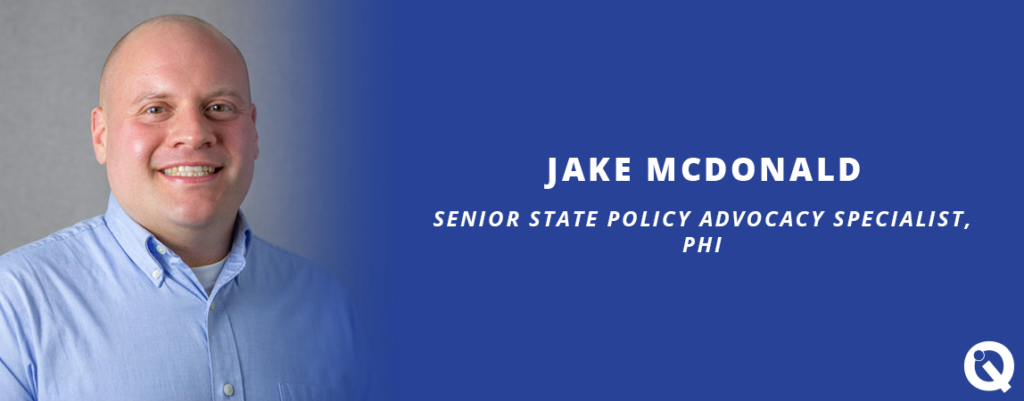Jake McDonald is a senior state policy advocacy specialist at PHI. PHI is a national organization that works to ensure quality care for older adults and people with disabilities by supporting the creation of quality jobs for direct care workers.
In New Jersey, PHI, the Quality Institute, and New Jersey Advocates for Aging Well are funded by the Henry and Marilyn Taub Foundation to co-lead the Essential Jobs, Essential Care New Jersey Coalition. What are the goals of the coalition?
Our goal is to strengthen the direct care workforce through policy interventions. We want to make sure that home health aides, nursing assistants, and direct support professionals — the people who care for us and our families — have high quality jobs. We want to be able to recruit and retain the workers we need for an aging New Jersey and for those with disabilities.
PHI is involved in Maine, Michigan and many other states. How will your experience in other states inform your work in New Jersey?
We’ve learned what works. Direct care workers are undervalued in a lot of ways. To fix that is to make sure they are compensated fairly and receive high-quality training and support— and that they are recognized for the work they do. We have seen real, concrete progress when states take a whole-of-government approach that seriously and comprehensively strengthens the entire direct care workforce by expanding the pipeline of new workers, reducing barriers to training, increasing total compensation for workers and funding for long-term care, creating career ladders and lattices for direct care workers, and collecting data on the workforce so we know where we need more workers and what is needed to recruit more of them.
What can states do to increase the number of people who want to pursue careers as home health aides, personal care aides, nurse aids and direct support professionals?
We have de-invested in the system. Most of the direct care workers are paid through Medicaid. We need to invest in our long-term care system so nursing homes and home health care agencies can compete with fast food chains and retail outlets for workers. We need free training for people interested in direct care. Beyond making sure folks are compensated fairly, there is low-hanging fruit. That would mean training and credentialing workers to move among settings, such as from homes to nursing homes. It would mean having easy-to-find and clear websites where people can find training and can understand what the job is about. An online registry that would enable workers to show their credentials and connect with employers. We can make it easier to get into the door and create advanced positions and career paths that make it easier to stay.
Today, we know that family members provide a lot of caregiving. How will a stronger direct care workforce help those caregivers as well as patients?
We hear from a lot of people caring for a loved one. They often feel like they are in over their heads. If we have enough direct care workers, then a family member could get support to perhaps take time away when they need a break or to hire a worker permanently if they want to stay at their job. They could take advantage of the things we just talked about, such as free and accessible training. Family members want to know they are providing the best care they can. Wisconsin and California, for instance, provide free training to home care workers, including unpaid family and friend caregivers. This allows unpaid caregivers to be certified as a paid caregiver if they’d like to pursue that as a career.
We support New Jersey’s PPP personal preference program. The program allows families in the Medicaid program to hire workers, including people they know and trust, such as a relative.
Finally, we like to ask a question beyond a person’s professional work. If you could choose anyone (throughout history or alive today), who would be your hero?
Although there are so many people I look up to, I recently read a biography of Ida B. Wells. She was so courageous and determined and generous. It astounds me that our gender and racial justice work is still catching up to her today, even though she was a woman born into slavery. I believe she would be beside us in our work today. Our workforce is 88 percent female and 81 percent people of color. They are relied upon to uphold our entire system and yet they are not recognized and valued for their work.

